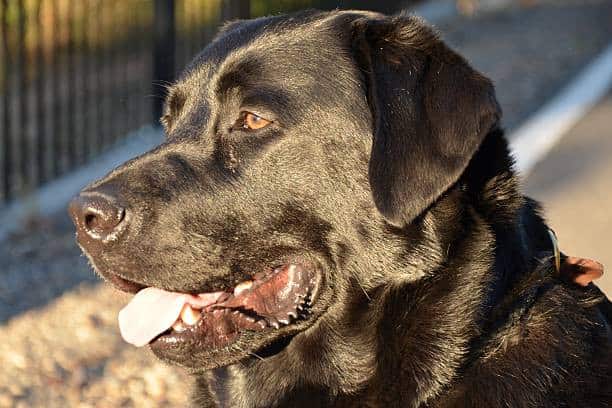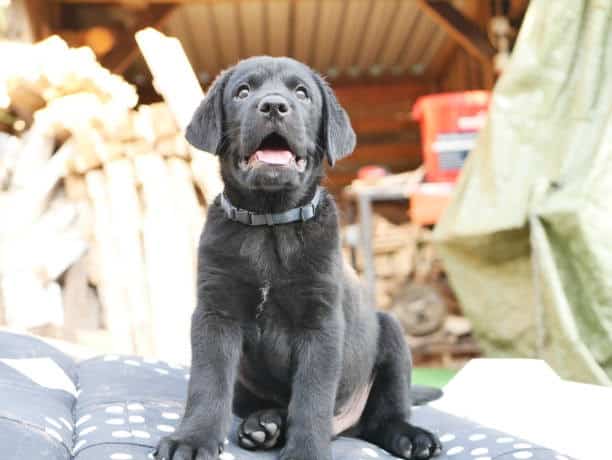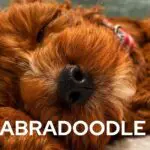A charcoal lab is a Labrador retriever dog with a unique grayish-black coat color instead of the usual yellow, chocolate, or black fur. This rare coloration occurs when two chocolate-colored Labradors produce puppies together and is caused by a dilution gene.
While charcoal Labs look distinctly different, they have the same friendly, energetic temperament that Labrador retrievers are known for. They make excellent family dogs and service animals just like any other Lab. The charcoal coat is just a cosmetic difference, not a separate breed.
Charcoal Labrador Origins
The charcoal Labrador retriever is a relatively new breed, first seen in the early 2000s. They result from breeding two Labrador Retrievers with the dilute gene, which causes their coat to be a lighter shade of black. The American Kennel Club does not recognize Charcoal Labs, but they are becoming increasingly popular as a pet.
This unique coat color is widely believed to have emerged from crossbreeding black Labs with other breeds, such as Weimaraner dogs or Chesapeake Bay Retrievers, carrying the dilute gene responsible for creating a lighter shade of black.

Charcoal Labrador Retriever Gene Pool
The fascinating aspect of Charcoal Labs is their unique coat color, which can be attributed to the presence of the recessive “little d” or dilute gene. This gene plays a significant role in determining the distinct charcoal shade within Labrador Retrievers.
For instance, if both parents pass on the dominant “big D,” then their offspring will have no trace of any dilution, resulting in a solid-colored Labrador Retriever. Conversely, if either one or both parents pass on at least one copy of the recessive “little d,” there is potential for diluted colors to emerge.
Unlike Silver Labs, whose diluted coats stem from chocolate ones due to this same gene interaction, Charcoal Labs results from a completely different set of genetic conditions involving another formative gene.

Appearance
Charcoal Labs have a unique smoky black coat color with hints of gray. They are often differentiated by physical features such as a crest on the chest and a whip-like tail instead of an otter tail.
Working Versus Show Labrador Retriever Charcoal Dogs
Labrador Retrievers are versatile dogs categorized into two distinct types – working and show Labs, each with unique characteristics. Working Labrador Retrievers are bred mainly for their hunting abilities, exhibiting strong prey drive and agility. These traits make them ideal companions for hunters or those seeking a more active pet.
In contrast, show Labrador Retrievers are bred specifically for conformation competitions, judged based on physical appearance. And also adherence to breed standards set by organizations like the American Kennel Club (AKC). These dogs have thicker builds and broader heads than their working counterparts.

How Much Should My Charcoal Lab Weigh?
Charcoal Labradors are medium to large-sized breeds of dog that can weigh anywhere between 55 to 80 pounds. It depends on various factors such as age, gender, and diet.
A Male charcoal labrador tends to be slightly larger than females and often falls within the higher end of this weight range. To ensure your Charcoal Lab stays at a healthy weight, they should receive regular exercise and a nutritionally balanced diet.
As with any dog breed, their nutritionally balanced dog food intake should be adjusted depending on their activity level and age. Puppies need more calories than adult dogs because they are still growing. Senior dogs may require less food due to lower activity levels.
Charcoal lab appearance
Charcoal Labradors are a medium to large breed and grow to be around 22-24 inches in height at the shoulder for males and 21-23 inches for females. They can weigh anywhere from 55-80 pounds depending on gender, diet, exercise routine, and genetics.
Charcoal Lab Temperament And Personality: Good family pet dog
These charcoal Labs are known for their friendly and loyal personalities, making them great family pets. They have a gentle, adaptable temperament and make excellent playmates for children. These dogs are also very sociable and enjoy being around people.
One of the most endearing traits of the Charcoal Lab is its affectionate nature. They love to cuddle with their owners and follow them wherever they go. Regarding energy levels, these dogs can be active but enjoy relaxing at home with their families.
Overall, if you’re looking for an intelligent dog that’s easy to train and has a lovable personality, look no further than the charming Charcoal Labrador Retriever!

How to take care of a charcoal lab?
AKC officially recognizes them as Black Labrador Retrievers. Charcoal Lab Puppies carry a dilute gene that sets them apart from other labs with dark coats.
Grooming A Charcoal Labrador Retriever
Grooming is an essential aspect of keeping your Charcoal Lab healthy and happy. Here are some tips for grooming your Charcoal Lab:
- Brush your dog’s coat regularly to prevent matting and tangling, particularly during shedding season. Use a slicker brush or de-shedding tool to remove loose hair and debris.
- Bathe your Charcoal Labrador with gentle dog shampoo every few months to keep their coat clean and healthy. Avoid over-bathing, as this can strip their skin of natural oils.
- Trim your dog’s nails regularly to prevent them from becoming too long and causing discomfort or injury. Use a high-quality nail clipper designed specifically for dogs.
- Clean your dog’s ears weekly with a damp cotton ball or ear cleaner solution to remove any excess wax or debris that could lead to infections.
- Brush your Charcoal Lab’s teeth daily with a canine toothbrush and toothpaste to maintain good oral hygiene and prevent dental problems.
- Check your dog’s eyes regularly for signs of infection or irritation, such as redness, discharge, or excessive tearing.
- Keep your Charcoal Lab’s anal area clean by wiping it gently with a damp cloth after each bowel movement.
Schedule regular grooming appointments with a professional groomer if you need more time or expertise to do it yourself.

Training A Charcoal Lab Dog
Charcoal Labrador Retrievers are intelligent and trainable dogs. These tips can help you train your charcoal Lab effectively:
- Use positive reinforcement techniques such as treats and praise to reinforce good behavior during training sessions.
- Start socializing your charcoal Lab early to get him used to other dogs, people, and environments.
- Consistency is key when training a charcoal Labrador retriever – avoid confusion by using the same commands every time.
- Use short training sessions of around 10 – 15 minutes each, several times a day, instead of long sessions that might overwhelm the dog.
- Focus on basic commands such as sit, stay, come, leave it, and heel before moving on to more complex tricks or obedience training.
- Encourage your charcoal Lab’s natural retrieving instinct by incorporating games of fetch into his exercise routine.
- Consider enrolling your dog in obedience classes or working with a professional trainer to reinforce good behaviors and address any problem areas.
How Much Exercise Does A Charcoal Grey Lab Need?
Charcoal Labrador Retrievers are energetic and require daily exercise to maintain their physical health and mental well-being. A healthy adult Labrador Retriever needs 1 hour of exercise every day.
This can include long walks, runs or hikes, playing fetch or frisbee, swimming in the pool or lake, and participating in canine sports like agility training. Labs originating from working dog breed lines will likely need more exercise than those from show dog lines.
What Is The Charcoal Lab LifeSpan?
The average lifespan of a charcoal silver Labrador Retriever is between 10 to 14 years, similar to other Labrador breeds. However, like all dogs, the lifespan can vary depending on allied factors.

charcoal lab health issues
All charcoal Labs face many health problems like other purebred Labrador Retrievers. One issue is overeating can lead to obesity and related health problems such as joint pain, diabetes, and heart disease.
Due to their unique coat color, follicular dysplasia in charcoal labs is common. This condition affects hair follicles, leading to thinning or patchy fur on the dog’s body. Additionally, while the purebred status of dilute Labradors, including Charcoal Labs, is questionable, these dogs may still be at risk for other common health issues found in Silver Labs.
One is patella luxation – a condition where knee caps tend to slip out of place, causing pain and discomfort for the dog.
Charcoal Labrador Health Testing
Here are some of the tests recommended for Charcoal Labradors:
- Hip dysplasia screening: This test checks for abnormal hip joint development that can cause arthritis and lameness in dogs.
- Elbow dysplasia screening: A test that looks for elbow joint abnormalities that lead to arthritis in later life.
- Progressive Retinal Atrophy (PRA) screening: A genetic test that identifies this inherited disease that causes blindness in dogs.
- Exercise-induced collapse (EIC) testing: A genetic test to detect a mutation responsible for this condition causes affected dogs to collapse after intense exercise.
- Centronuclear myopathy (CNM) testing: Another genetic test to detect a mutation causing muscle weakness and wasting in affected dogs.
- Follicular dysplasia screening: This is a skin disease common among certain dog breeds, including Charcoal Labs, where hair fails to grow properly due to a defect in the hair follicle.
Charcoal Lab: Is This The Right Dog Breed For You?
The Charcoal Lab may be an excellent choice for getting a dog. Their friendly and affectionate nature makes them great pets for families and individuals. Here are some factors to consider before you get yourself a charcoal lab.
Firstly, Charcoal Labs require plenty of exercise and attention. They were originally bred as working dogs used in hunting and retrieving games.
Secondly, proper grooming is vital to keep your Charcoal Lab looking good and healthy. Their double coat requires brushing at least once weekly to eliminate loose hairs and prevent matting.
Finally, it’s worth noting that controversy surrounds the registration of “silver labs” by the American Kennel Club (AKC).
silver vs charcoal lab
The only difference between silver and charcoal Labradors is the color of their coats. Silver Labs have a diluted chocolate coat, while charcoal Labs have a diluted black coat. This means that charcoal Labs are slightly darker than silver Labs.
Other than their coat color, silver and charcoal Labs are essentially the same dog. They have the same temperament, size, and intelligence as all other Labradors.
They are both loving, loyal, and easy-to-train dogs that make great companions for families and individuals.
| Feature | Silver Lab | Charcoal Lab |
|---|---|---|
| Coat color | Diluted chocolate | Diluted black |
| Nose and eye color | Light brown nose, blue or light-yellow eyes | Black or brown nose, brown or hazel eyes |
charcoal vs black lab
The only difference between charcoal and black Labs is the color of their coats. Charcoal Labs have a diluted black coat, while black Labs have a solid black coat. This means that charcoal Labs are slightly lighter in color than black Labs.
how do you get a charcoal lab?
If you’re looking to add a Charcoal Lab puppy to your family, there are various places where you can find them for sale or adoption. Some of the best places to look include:
- AKC Marketplace: The American Kennel Club offers a marketplace where breeders can list their available puppies, including Charcoal Labs.
- Charcoal Lab Breeders: Many breeders specialize in breeding Charcoal Labs. You can find them online or through breeder directories. Make sure to research and choose a reputable and responsible breeder.
- Local Animal Shelters and Rescues: Charcoal Labs and other Labrador Retrievers often end up in shelters or rescues for no fault. Adopting these organizations saves a life and allows you to rescue a purebred pup.
- Online Classifieds: Websites like Craigslist and Facebook Marketplace offer puppies for sale from individual sellers. However, exercise caution when buying from these sources, as scammers often use these platforms for fraudulent sales.
- Referrals from Friends and Family: Ask your friends or relatives who own charcoal lab puppies if they know any reputable breeders with pups available.
Before purchasing or adopting any dogs, ask questions about the parent dogs’ health history, puppy-rearing process, genetic testing results, etc.
| Breeder | Location | Years in business | Reputation |
| Charcoal Labs USA | Florida | 5+ years | Newer |
| Coal Creek Labradors | Colorado | 5+ years | Small |
| High Country Labradors | North Carolina | 10+ years | Reputable |
Does The AKC recognize Charcoal Labrador Dogs?
While Charcoal Labs are purebred Labrador Retrievers, they are not recognized by the American Kennel Club (AKC). Instead, AKC registered Charcoal Labs as Black Labradors due to their smoky black color.
Charcoal Labs are not be acknowledged as a separate color variation by AKC compared to Yellow or Chocolate Labradors. However, they remain popular among dog owners who appreciate their striking appearance and loyal disposition.
FAQ
are charcoal labs purebred?
Yes, Charcoal Labs are purebred Labrador Retrievers that carry a dilute gene. Due to their unique coat color, they may appear differently from the traditional black, yellow, and chocolate-colored Labradors.However, they are still considered 100% purebred by the American Kennel Club (AKC) and other organizations dedicated to preserving dog breeds.
What Is The Rarest Lab Puppy Color?
Labrador Retrievers are known for their beautiful coat colors, with black being the most common, followed by yellow and chocolate. However, some rare Labrador colors also exist, with white, red, and silver among them.
Silver Labradors have the rarest coat color, ranging from a light black shade to charcoal with hints of gray. The rarity of this color variation stems from the fact that it is produced by a dilute gene that can also produce other uncommon colors, such as champagne lab and silver-yellow lab.
IS charcoal lab eye color blue?
While some Silver Labs may have blue eyes as puppies, it is not necessarily the case for Charcoal Labs. Eye color in dogs is determined by genetics and not coat color. However, there are rare instances when a Charcoal Lab may maintain blue eyes even as they mature.
Do Charcoal Labs Shed A Lot?
Like other Labrador Retrievers, Charcoal Labs shed a lot due to their thick double fur coat. They shed all year round, increasing shedding during the spring and fall seasons when they lose more fur.
However, shedding can be reduced through proper grooming and nutrition. Shedding is inevitable for this breed and may negatively affect people with allergies since dander from dog hair triggers allergic reactions in humans.
Are Charcoal Labs Rare?
Charcoal Labs are rare due to their unique coat color and the dilute gene they carry. Finding a reputable breeder should be a top priority when searching for a Charcoal Lab puppy. Some breeders may purposefully breed these dogs excessively or pass off other colors as Charcoals to meet demand and make quick profits.
Are Charcoal Lab Dogs Hypoallergenic?
Unfortunately, Charcoal Lab dogs are not hypoallergenic. While they have a short, dense coat that may shed less than some other breeds, Labradors are known for shedding in large amounts throughout the year.
This is because their double coat helps to protect them from colder weather and water when hunting or retrieving. Labs produce dander (tiny flakes of skin) and saliva that can trigger allergies in susceptible individuals.
Author Profile
- Site Owner And Planning Specialist
-
Aritra, the founder of Labradorandyou.com, is a lifelong dog lover whose passion ignited for Labradors for their loyalty and intelligence. With extensive research and personal experiences, Aritra has become a Labrador expert, offering a rich resource on the breed. Labradorandyou.com provides reliable, timely, and evidence-based information, including Labrador-specific product reviews, training techniques, and care tips.
Labradorandyou.com was born out of Aritra's passion and his desire to share his profound knowledge about the breed. The site serves as a comprehensive resource, offering a wealth of up-to-date information for Labrador owners and enthusiasts alike
Also by the author
-
 FAQNovember 17, 2023How To Adopt An Emotional Support Dog?
FAQNovember 17, 2023How To Adopt An Emotional Support Dog?
-
 Mix-BreedsNovember 16, 2023Red Labradoodle Ultimate Guide: Breed Facts, Care Tips
Mix-BreedsNovember 16, 2023Red Labradoodle Ultimate Guide: Breed Facts, Care Tips
-
 Top BreedersNovember 8, 2023Breeding Labradors: Everything You Need to Know
Top BreedersNovember 8, 2023Breeding Labradors: Everything You Need to Know
-
 FAQOctober 17, 2023Do Dogs Like Music? Researchers Say Yes! Find Out
FAQOctober 17, 2023Do Dogs Like Music? Researchers Say Yes! Find Out